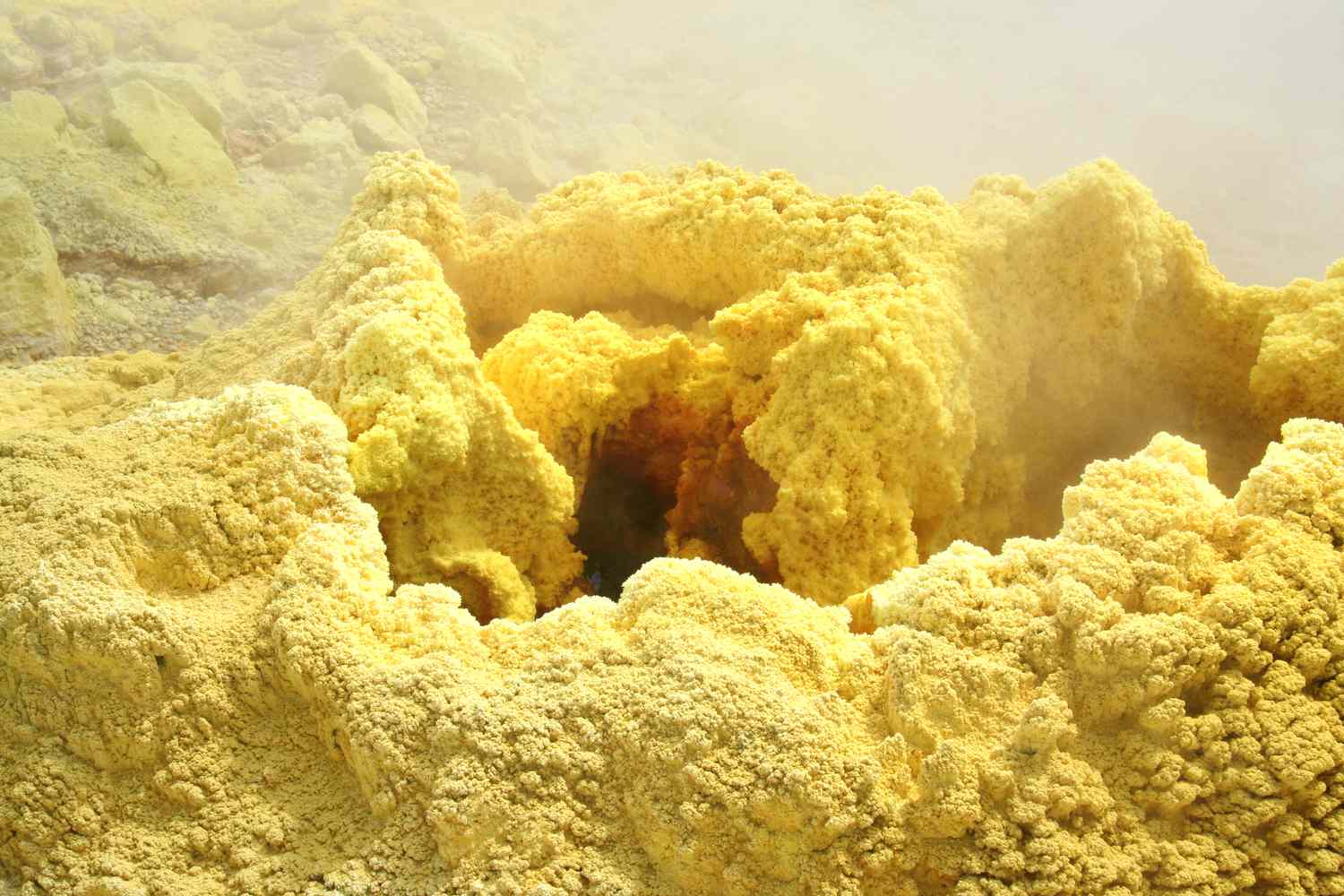
Sulfur is an essential chemical element that plays a crucial role in various aspects of our lives, from industry and agriculture to the environment and human health. This often-overlooked element has a fascinating array of properties and applications that make it a topic worth exploring. In this article, we will delve into 18 intriguing facts about sulfur, shedding light on its significance and impact. From its role in the formation of amino acids to its presence in volcanic eruptions, sulfur's influence is far-reaching and multifaceted. So, let's embark on a journey to uncover the lesser-known aspects of this remarkable element. Get ready to be surprised and intrigued by the diverse and compelling nature of sulfur. Now, let's dive into the captivating world of sulfur and uncover its many secrets.
Key Takeaways:
- Sulfur is a vital element for life, found in amino acids and vitamins, and used in various industrial processes. Its distinct smell and yellow color make it a unique and essential part of our world.
- Sulfur plays a crucial role in environmental processes, from the formation of minerals to its impact on climate patterns. It’s also used in food preservation and has medicinal uses, making it a versatile and important element in our daily lives.
Sulfur is an essential chemical element.
Sulfur, also spelled as sulphur, is a multivalent non-metal abundant in the Earth’s crust. It is a vital element for life and is found in amino acids, vitamins, and coenzymes. Sulfur is known for its distinct yellow color and is commonly found in its elemental form as well as in sulfide and sulfate minerals.
Sulfur has an atomic number of 16.
With an atomic number of 16, sulfur is represented by the symbol ‘S’ in the periodic table. It is a non-metal and belongs to Group 16, also known as the chalcogens. Sulfur exhibits unique chemical properties and forms various compounds with other elements, playing a crucial role in numerous industrial processes and biological functions.
Sulfur has been used since ancient times.
The use of sulfur dates back to ancient civilizations, where it was employed in various applications such as fumigation, medicine, and skincare. Its distinctive odor and flammability made it a valuable substance in early civilizations, and it continues to have diverse applications in modern times.
Sulfur is an essential nutrient for all living organisms.
As a component of amino acids, sulfur is fundamental for the structure and function of proteins in living organisms. It is a crucial nutrient for plants, animals, and microorganisms, contributing to the overall health and vitality of ecosystems.
Sulfur is commonly used in the production of sulfuric acid.
Sulfuric acid, one of the most widely used chemicals globally, is produced through the chemical reaction of sulfur with oxygen. This versatile acid is a key component in various industrial processes, including the manufacturing of fertilizers, detergents, and chemicals.
Sulfur is found in various natural forms.
From volcanic deposits to mineral ores, sulfur exists in diverse natural forms across the globe. It is a constituent of many minerals, including pyrite, galena, and gypsum. Additionally, volcanic activity releases sulfur compounds into the atmosphere, contributing to global sulfur cycles.
Sulfur has a distinct odor.
Sulfur is renowned for its characteristic smell, often described as resembling rotten eggs. This odor is evident in various sulfur-containing compounds and is used as a diagnostic feature in identifying the presence of sulfur in different substances.
Sulfur plays a role in environmental processes.
From the sulfur cycle to atmospheric interactions, sulfur influences various environmental processes. It contributes to the formation of sulfate aerosols, which can impact climate patterns, and participates in natural geochemical cycles crucial for ecosystem stability.
Sulfur has numerous industrial applications.
Due to its diverse chemical properties, sulfur is utilized in a wide range of industrial applications. It is used in the production of rubber, paper, and detergents, as well as in the vulcanization of materials to enhance their strength and durability.
Sulfur is an important component of many minerals.
Many minerals contain sulfur as a significant constituent, contributing to their physical and chemical properties. Sulfide minerals, such as pyrite and sphalerite, are abundant in various geological formations and are valuable sources of sulfur for industrial processes.
Sulfur is a key element in the formation of organic compounds.
Organic molecules containing sulfur, known as organosulfur compounds, play essential roles in biological systems and chemical synthesis. From garlic’s characteristic aroma to the protective effects of antioxidants, sulfur-containing organic compounds have diverse and significant impacts.
Sulfur exhibits allotropy.
Sulfur exists in several allotropes, with the most common form being yellow crystalline solid. The allotropes of sulfur have distinct properties and are utilized in various applications, ranging from matches and gunpowder to pharmaceuticals and pesticides.
Sulfur is crucial for the formation of minerals.
In geological processes, sulfur plays a vital role in the formation of minerals and ore deposits. Hydrothermal systems enriched in sulfur contribute to the deposition of valuable metal sulfide ores, shaping the Earth’s mineral resources.
Sulfur has medicinal and therapeutic uses.
From traditional remedies to modern pharmaceuticals, sulfur compounds have been utilized for their medicinal properties. Sulfur-containing compounds are employed in treatments for various skin conditions and are essential components of certain antibiotics and antifungal medications.
Sulfur is involved in the formation of proteins.
Proteins, essential macromolecules for life, contain sulfur in the form of amino acids such as cysteine and methionine. These sulfur-containing amino acids contribute to the structure and function of proteins, playing critical roles in biological processes.
Sulfur is a component of essential vitamins.
Several vitamins, including biotin and thiamine, contain sulfur in their chemical structures. These sulfur-containing vitamins are crucial for various metabolic pathways and are essential for maintaining overall health and well-being.
Sulfur is a key element in the Earth’s biogeochemical cycles.
As part of the global sulfur cycle, sulfur undergoes transformations and transfers between different reservoirs, including the atmosphere, lithosphere, hydrosphere, and biosphere. These biogeochemical cycles are fundamental to ecosystem dynamics and environmental processes.
Sulfur is utilized in the preservation of food.
Sulfur dioxide, a compound derived from sulfur, is employed as a preservative in the food industry. It helps prevent spoilage and oxidation in various food products, extending their shelf life and maintaining quality.
Conclusion
Sulfur is a fascinating element with a wide range of applications and importance in various industries and natural processes. From its role in the formation of amino acids and proteins to its use in the production of sulfuric acid and fertilizers, sulfur plays a crucial part in our daily lives. Its unique properties and compounds make it a key player in fields such as medicine, agriculture, and industry.
Understanding the diverse characteristics and uses of sulfur is essential for appreciating its significance in the world around us. As we continue to explore and harness the potential of this element, we can look forward to further advancements and innovations that leverage the remarkable properties of sulfur.
FAQs
What are the common uses of sulfur?
Sulfur is used in the production of sulfuric acid, fertilizers, and various chemicals. It is also employed in the vulcanization of rubber and the manufacturing of gunpowder.
Is sulfur harmful to the environment?
While sulfur dioxide emissions can contribute to air pollution and acid rain, proper environmental management and regulations help mitigate its impact. Sulfur is also essential for the growth of plants and is a component of natural minerals in the Earth’s crust.
Can sulfur compounds be beneficial for health?
Certain sulfur compounds, such as those found in garlic and onions, have been linked to potential health benefits, including antioxidant properties and cardiovascular support. However, excessive exposure to certain sulfur compounds can also pose health risks.
Was this page helpful?
Our commitment to delivering trustworthy and engaging content is at the heart of what we do. Each fact on our site is contributed by real users like you, bringing a wealth of diverse insights and information. To ensure the highest standards of accuracy and reliability, our dedicated editors meticulously review each submission. This process guarantees that the facts we share are not only fascinating but also credible. Trust in our commitment to quality and authenticity as you explore and learn with us.


